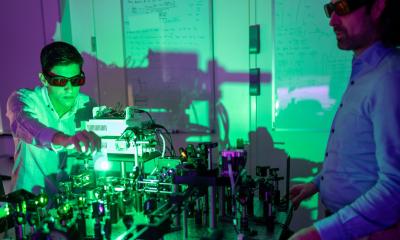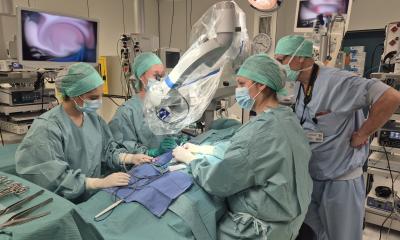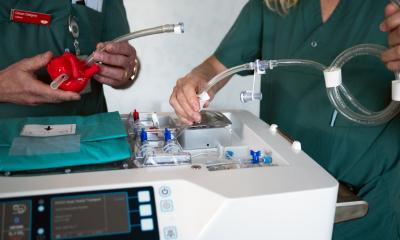The impact on soma and psyche
Rostislav Kuklik examines the psychological effects of organ, limb or face transplants on the recipienTS
There is a profound difference between the complexity of cosmetic surgery or organ transplant procedures, for example, and other operations. Whilst procedures such as hair transplants or eyelid surgery present an alteration to the owner's body composition and changes to the patient's outlook, those changes were desired and planned for, in the hope that something marvellous will result and so improve both soma and psyche.
But what is the impact on a patient’s mind if his/her corporeal self-image must undergo more intense changes, less expectedly, and with less improvement to somatic qualities? Gradual stages are sometimes employed to describe the effect. These begin with, for example, the desired hair transplants, through to internal organs transplantations (and related procedures such as immunosuppressive treatment or chemotherapy), and end with those procedures that heavily impact on a patient’s social interactions, e.g. by totally changing the look of the face. The very last group of the patients must cope with the most intense emotions and complex feelings imaginable.
Some 20 years ago, Italian psychiatrist S. Chiesa wrote: ‘…the possibility of integrating the donated organ into one’s own corporeal image passes through the progressive maturing of the defensive processes, in other words, the patient’s abandoning of archaic mechanisms, such as denial, and the patient’s use of the ego’s capabilities of functioning according to the secondary processes of objectiveness and neutralisation. Only in this way can the transplant, from a cognitive-affective point of view, be achieved through slow metabolising, starting from the initial stage in which the organ is seen as a “foreign body”, an ambivalent object “good to incorporate” and at the same time “invested with diffidence” because of its intrusive state, across the phases of partial incorporation and reaching, therefore, the complete incorporation when the organ has become an integral part of the physiological functioning and, therefore, of the corporeal image; and so the new organ becomes an integral part of the sense of self.’ (1)
Doubtless much truth lies behind those words, but they only define what the patient must go through to cope with a new internal body part from a cadaver. How does it feel to persuade oneself that it is absolutely fine to have something inside that had belonged to another living (and now dead) person?
In fact, when it comes to organ transplants (e.g. heart, lungs, kidneys), this is a hypothetical mental construction. By the way, according to Levy ‘…the kidney was the first vital organ to be transplanted and the progenitor of knowledge of transplant immunology and psychology. With dialysis, it has heralded a new phase of medicine in which organs necessary for life can be replaced by transplanted ones or by artificial means. Many factors play a role in the decision to donate a kidney. Psychiatric complications of renal transplantation include those arising as a result of the use of immunosuppressants, anxiety, and sexual dysfunctions. Treatment should address the identifications of patients who are prone to psychological complications, the use of psychotropic medications, and the use of behavioural techniques for sexual dysfunction’. (2)
Instantly, another question surfaces: That’s very nice; however, both these citations were made 15 to 20 years ago, and dealt with invisible body parts. Hence we can assume that the intrinsic mental war the patient had to win might not have been that intense compared with transplants affecting the outer ‘shell’. What happens to the mind if preoccupied with the very latest surgical transplants: limb, face or sexual organs?
In 1998, the first hand transplantation was performed in Lyon, France. Two years later, the same surgical team transplanted both hands.
In 2005, a woman disfigured by dog bites received a full face transplant, performed by surgeons in Amiens, France. To date, about 40 full face transplants have been carried out worldwide. Then, in April 2009, the most extreme transplant case was announced – from France again. A 25-year-old man, heavily burnt in a traffic accident in 2004, received two new hands and a face during a procedure that lasted about 30 hours and involved 40 surgeons and other professionals.
Back to the question of what such a person must go through both physically, due to immunosuppressive treatment and ‘foreign’ genetic material that present many problems, and also psychically: mental complications are quite frequent. The patient may struggle with deep remorse towards the dead donor; feelings of loss of ‘self’; sensations of alienation, or even a major depression (for obscure reasons, etc.). The burden must be tremendous, despite the fact that it usually takes a relatively long time before a suitable donor is found. However, once a donor has been found, everything is rapidly set in motion, just hours later. The patient must decide almost immediately and prepare for the surgery; all of which means there is zero room to reconcile one’s thoughts. Again, the burden is surreal. The extent of mental suffering is perhaps highlighted by this paragraph from Wikipedia (http://
en.wikipedia.org): ‘Clint Hallam (born in New Zealand) was the first recipient of a human hand transplant. Hallam lost his hand in circular-saw accident at Rolleston prison in 1984, where he was serving time for fraud. The original replant (the reattachment of the severed limb) didn’t take, and he had his hand amputated. After an initially successful period of over two years, in which he could move and even write with the fingers of the new hand, Hallam voluntarily stopped taking his immunosuppressive drugs. The hand was then amputated at his request, on 3rd February 2001.’
Certainly, the human psyche is individual matter and extremely frail and complex. What one person can withstand without a blink, another cannot bear at all. The truth is that, regardless of outcome, all patients deserve a second chance.
(1) Chiesa S – Il trapianto d’organo: crisi e adattamento psicologico – Psichiatria e Medicina, 10, 15, 1989. The organ transplant: crisi and phsycological adjustment – Psychiatry and Medicine, 10, 15, 1989
(2) Levy NB - Liaison Psychiatry Division, New York Medical College, Valhalla, NY 10595
01.07.2009







